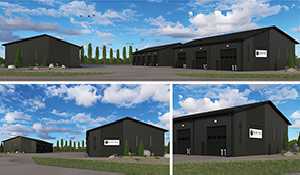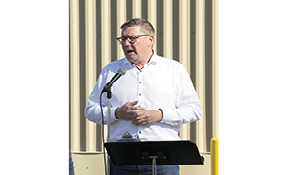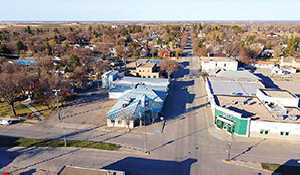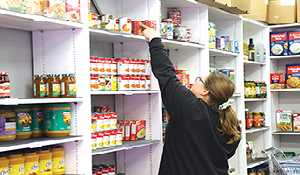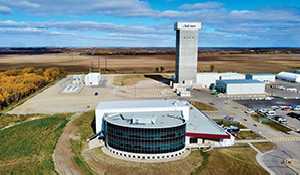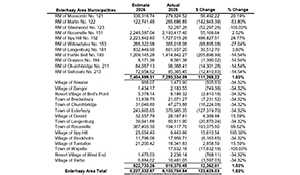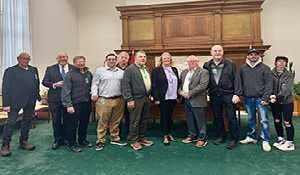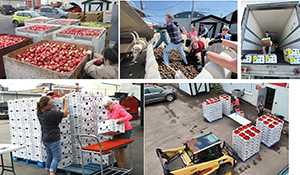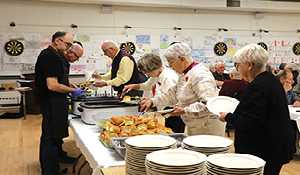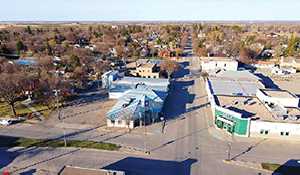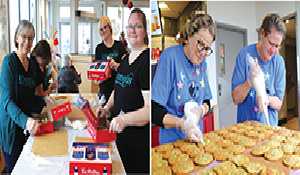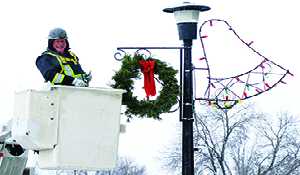Sask churches adapting to Covid-19 guidelines
February 23, 2021, 2:11 pm
Spencer Kemp, Local Journalism Initiative Reporter
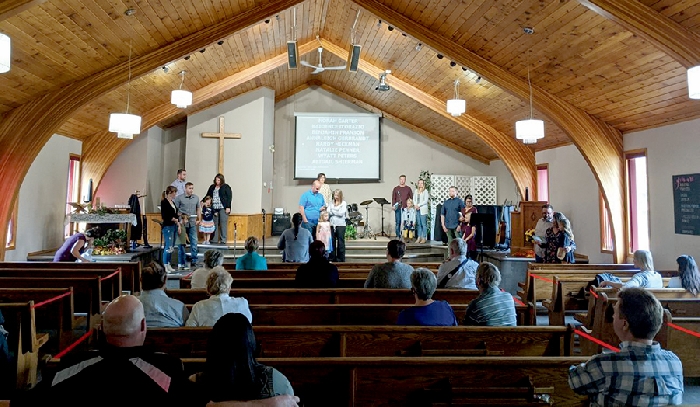

Guidelines for worship in Saskatchewan have limited the number of individuals who can attend a service through the COVID-19 pandemic.
Each church has had to adapt and adhere to the new guidelines, which includes a maximum gathering size of 30, while finding new ways to provide its services to its congregation.
Moosomin Baptist Church
Moosomin Baptist Church took the opportunity through COVID-19 to upgrade its technology to provide its followers with services even through the restrictions.
Pastor Jonathon Shierman joined the church in May 2020 and has since had to adapt and overcome the ongoing regulations.
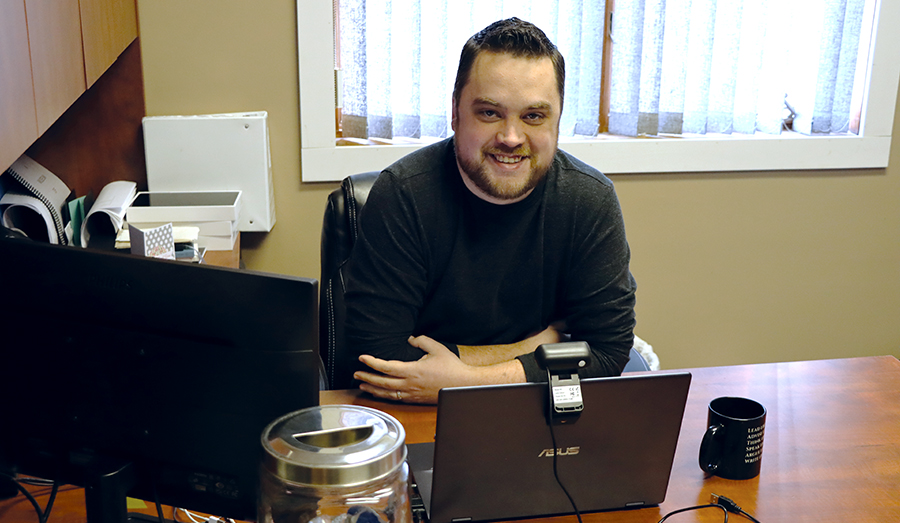

“It has completely changed the way we approach almost everything we do. By its very nature, church ministry is meant to be relational and it is at its best when it is in person and done in the community. Trying to balance that with trying to preserve the sanctity of life, which is also something we stand strongly for, its been a great challenge. I am so grateful for technology, it is not a perfect substitute, but it has allowed us to keep some things going, obviously, with a church of our nature we sit at about 100 to 120 on a Sunday morning, we have not been able to have those kinds of numbers, even for regular service. It’s impacted our children’s ministries, it’s impacted our youth ministries, things like that. The biggest challenge has been adapting to the ever-changing rules. The guidelines keep moving and I’m aware of why. I’m supportive of why. We need to keep adapting to things, but it takes churches a couple of weeks to figure out how we’re going to adapt our ministries to new rules. Every time we feel that we’ve figured it out, the rules change on us again. I understand that, but it’s by far been the biggest challenge,” said Shierman.
According to Shierman, the church had been working on upgrading its technology since before COVID-19, and the pandemic only proved to accelerate that process.
“We’ve invested pretty heavily in technology. It is something that we were hoping to do pre-pandemic anyway. With me coming here at the beginning of May, it was something that we had talked about during my hiring process. The pandemic has really accelerated that. We have gone to live streaming our services, I’ve had to take a crash course in learning how to video stuff and edit clips, they don’t really teach you that in Seminary, but it’s something that I think every pastor has had to learn,” said Shierman. “Even the practical side has presented challenges. When I got here, the internet here at the church was not sufficiently fast enough for us to do live streaming. We had to upgrade our internet and get some fiber optic installed. The changes we’ve had to make are not as simple as flipping a switch, even if we wanted to. We’ve had to invest in cameras, we got some great camera technology and sound equipment. Those kinds of things take time to get and learn.
Senior members of the church have had how-to packages put together by members of the church to ensure they could access the materials. The church also provided their younger members packages in the absence of their youth ministries.
“We’ve had to restrict our children’s ministries and we’re doing that remotely now with stuff through video and YouTube and putting packages together for children to do at home with their families. We’ve had to get creative, but it’s thanks to the technology that we’ve been able to do this at all.”
Shierman explained that they have also offered to copy their services on CDs or USB drives to provide to those without internet, but it has been something that nobody has utilized yet.
“One of the great things about a church like ours is that the people rally around each other. So for the people who are more remote and don’t necessarily have fast internet or any internet at all, they have people around them helping them get it and get it set up.”
Before the pandemic struck, Moosomin Baptist Church had set up e-transfers for donations, which proved useful when restrictions started limiting the number of people who could attend services.
Shierman says that thanks to this, they have been able to still receive their usual donations.
“We adapted very quickly, it was one of those things that was overdue and the pandemic just sped up our approach. Before I got here, they moved to online giving and e-transfers and people have really rallied around that. People really appreciate the simplicity of it, if I’m being honest. It even streamlines things on our end for our church and our treasurer and finance team. We still have a few people who still like giving a cheque, which is great, but of course, we can’t hand around an offering plate,” Shierman explained. “Our church is entirely funded through regular giving by our churchgoers. It goes towards everything from keeping the lights on to paying staff to all the investments into technology that we’ve done. We’ve been very fortunate as a church. Our giving has remained fairly consistent throughout the pandemic. There have been some dips and challenges, but nothing like what I’m hearing a lot of other churches are going through. We’ve had some huge unexpected expenses in certain areas because of the pandemic, but most of that has fortunately been offset because of savings in other areas because of the pandemic. By not being able to run things in person, the silver lining is you save on some of those costs and are able to reallocate money elsewhere.”
Moving forward, Shierman says that they have plans to continue their live streams and online content, but are looking forward to a return to normal.
“This is something that had been talked about since anybody even heard of COVID-19, going to a digital format and offering things in different formats is something we discussed when I was hired. It’s not going anywhere. Certain things we’re doing I can’t wait to get rid of, things like making our churchgoers RSVP ahead of time, that is just a practical necessity, but I am looking forward to the day when we no longer have to do that. But things like streaming the service on Sunday morning for people who can’t be here in person? That’s not going anywhere. We invested in this technology knowing that we would continue to use this long-term.”
Hope Congregational, Rocanville
While some churches have had to reduce their congregation size due to COVID-19 restrictions, others like Hope Congregational in Rocanville have been fortunate enough to keep their entire congregation due to it being below the provincial limit.
Head Pastor Paul Bunz says their biggest concern is the inability to be close to one another.
Bunz explained that despite the restrictions, they have been able to keep their services going through the pandemic.
“At this point, we’ve been able to keep these services going every Sunday with the amount of people we have. We also have Wednesday morning Bible study which continued and prayer meetings on Friday morning which has continued. Quite honestly we haven’t really noticed that much change except for some of the restrictions about wearing masks and our social distancing. That’s probably been the hardest for us, not because we can’t do it, but because we don’t believe that is what we should be doing,” Bunz explained. “I’m not quite convinced with myself that masks are that effective and social distancing really is as effective as we are lead to believe they are.”
Financially, however, Bunz says that their church has seen an increase in donations through the pandemic.
“Our givings have actually gone up, to be totally honest. Our offerings have actually gone up a fair amount since the start of COVID-19. We actually have had growth in the church as well. When COVID first hit, we didn’t close our doors at all. Some churches weren’t having services but we kept on having services and people coming who wanted to come to the Sunday morning service. That has certainly helped financially.”
Bunz did express concerns in regards to the inability to be close to one another, as the current health guidelines require a two-metre distance between households.
“We do Facebook live services every Sunday morning since the pandemic started. I think that will probably continue even after some of the restrictions are lifted. But that being said, I firmly believe that God created us as social beings right? And we need that personal contact with another being. That hug and a handshake and the fellowship. I think that’s really important and I think the biggest thing we struggle with is the lack of that, though we still do it.”
These restrictions had also previously made the church unable to hold its Fellowship Lunch.
“What we’ve done is we’ve followed the COVID-19 restrictions as much as we can when we think it’s not going against the word of God.” Said Bunz. “I think that it becomes an individual church’s decision. I know some churches think that it’s civil disobedience right from the start. I’m a firm believer in Romans 13, obeying the laws of the land, so if we can do that I think we need to do that. That being said if we are prepared to break the rules or do civil disobedience, then we need to be prepared to accept the consequences of the disobedience as well. If we’re not going to wear the masks, if we’re not going to social distance there could be consequences as well.”
“We have signs up to tell people to wear their masks, we have signs up telling people to sanitize their hands, and we’ve put down our chairs and put up our tables six feet apart. We’ve followed all that protocol. What I told them is that we will put the signs up, that we will have the masks and sanitizer here, but what I told them is that I am not a Saskatchewan Health Authority enforcer. I am not enforcing their restrictions. We ask people to follow them, but if they feel that they don’t want to then I’m not going to stand at my door and enforce people to wear masks.”
“They do wear masks on entering the building and they wear their masks when they leave, a vast majority of them at least. During our services, we don’t. Some do, but it becomes an individual choice really, which I am fine with. Like I said, I am not an enforcer and I won’t ask them to leave if they don’t wear a mask.”
Bunz adds that regardless of what restrictions are put in place, he has no intention to close the doors of his church.
“I just think that again, on a personal level at least as Pastor of a church, people just need to search their own hearts and do what they believe God is telling them to do,” Bunz said. “This church will not close. Regardless of what restrictions come, this church will not close down. Even if they tell us that we can’t have any services at all, it isn’t going to happen. I’ve said that since COVID-19 started, and that’s still my position, we will still have a Sunday morning service, we will not turn people away.”
River of Life Church, Moosomin
The River of Life Church in Moosomin has raised concerns with the provincial government regarding the restrictions that have limited their congregations size and how they operate.
Pastor Al Lautamus with the River of Life Church expressed his concerns with the ongoing restrictions which have limited the number of attendees in his congregation.
“The biggest thing is that we can’t have a full church. People don’t like to wear masks so they don’t come. And some people are just terrified so they don’t come. They’ve been scared so bad that they think they’ll die tomorrow if they catch it.”
The church has not moved to any online platforms yet, electing to continue its in-person services.
“We have decided that we don’t want to go online. We’re distancing and wearing masks Our attendance is down because of it, but it’d have to be down anyway so what difference does it make. It doesn’t really matter, there are so many people who don’t want to wear the masks so they don’t come and we’ve only got about 30 people anyways.”
Much like the Hope Congregational Church in Rocanville, the River of Life Church has seen an increase in donations through the pandemic.
“Our donations actually went up last year by a considerable amount. Even though people didn’t come to church, they still sent their tithes and offerings.”
Esterhazy Baptist Church
While the Government of Saskatchewan has imposed restrictions to crowd sizes for places of worship, Esterhazy Baptist Church has adapted to utilizing podcasts for those unable to attend the sermons in person.
Pastor Robert Moss explained that they began doing podcasts and offering dial-in sermons for those without internet.
“We certainly followed the provincial guidelines. We started connecting with email more than we used to and we began a webpage and podcast as well as a dial-in sermon. Now we also need to use online booking to reserve seats and things like that. Certainly connecting with people over the phone as well have been some of the main things.” Moss said. “We have the dial-in sermon for people who don’t have the internet to come and call and listen to that week’s message. We also have our podcast on our webpage so people can listen or read there.”
Through savings, Moss says that they have been able to maintain their budget and keep afloat despite all the unexpected costs brought on due to the pandemic.
There have been some concerns expressed by Moss around the children’s ministries their church has been unable to offer due to the pandemic.
“One of the biggest things that I feel we are missing because of COVID-19 is our children’s ministry. I’m concerned that we’re not able to minister to our children the way we used to. Adults can sit down and listen to a sermon, but that’s not how you relate to children. It’s difficult to do that and maintain that six-foot distance between you and each child. That’s been the biggest thing I think that’s taken a hit. So I think we need to keep praying for the kids.”
Moving forward, Moss expressed interest in continuing the podcast and dial-in sermons for those interested.
Public health guidelines have been extended to March 19 and all places of worship must reduce capacity to 30 people, including wedding, funeral, and baptismal services. Guidelines for worship in Saskatchewan have limited the number of individuals who can attend a service through the COVID-19 pandemic.
Each church has had to adapt and adhere to the new guidelines while finding new ways to provide its services to its congregation.
St Andrew's United Church, Esterhazy
While COVID-19 restrictions have prevented places of worship from gathering more than 30 individuals, St Andrew's United Church in Esterhazy has been fortunate enough to keep their congregation below the maximum limit.
Board chair Fern Forsythe-Hohm explained their main concern from the restrictions is the impact it has had on their fellowship.
“The biggest thing that we have found is the fellowship, not being able to have the different functions that we have throughout the year. Things like the fundraisers that keep our church open, and things we do to basically keep our community together as well. We can’t do things like our Sunday school, because of course a lot of parents aren’t bringing their kids to church, our Sunday school is not even functioning at this point and we shut it down as soon as COVID hit. Not having children in the church has made a big difference for us, even in the older people we’ve noticed, “We have one of the biggest Sunday schools in the region, so that’s a big feather in our cap,” Forsythe-Hohm said.
While their numbers have stayed around the capacity of 30, they have had to remove some services that attract more than the allowed amount.
“It’s just been really hard even when working within the guidelines, that you want to still be able to see your pews full. If at any time you hit that number of 30, you have to turn people away. We’ve had to cut back some of our services, we didn’t do things like our Christmas Eve service this year like we normally would have. We didn’t want more people to show up like they normally do and have to turn them away.”
Financially, St Andrews United Church has been hit hard by the pandemic, unable to host its fundraisers that keep its doors open.
To help offset the lost income, Forsythe-Hohm says they were able to access government funding that was made available.
“We haven’t been able to do our big fundraiser for our year through the United Women’s Council is our rummage sale every year, and of course not having that even though it’s the perfect time of year to do it because everyone is clearing out their closets.”
Much like other churches in the region, the St Andrews Church in Esterhazy has begun to offer live-streamed services to those unable to make it to their in-person services. It is also something they are considering keeping when the pandemic ends.
“At the start, we did do the live streaming, but now we had a transition of ministers and this new gentleman will be setting up a new live stream. Every service from here on out will be live-streamed until the government says we can gather again,” Forsythe-hohm said. “We actually had a little bit of a discussion with our board meeting, and there are people out there who can’t get out of their homes but are very much interested in just doing the live streaming. So we would definitely consider continuing on with it.”
Bethel United Church, Moosomin
Through the COVID-19 pandemic, Bethel United Church in Moosomin has seen a dip in donations but has kept their congregation safe by utilizing the Zoom platform for services after the government imposed a maximum in-person congregation size of 30 people.
Rev. Carolyn Woodall, the interim minister for the Bethel United Church, says the move to the online platform was a difficult one to make.
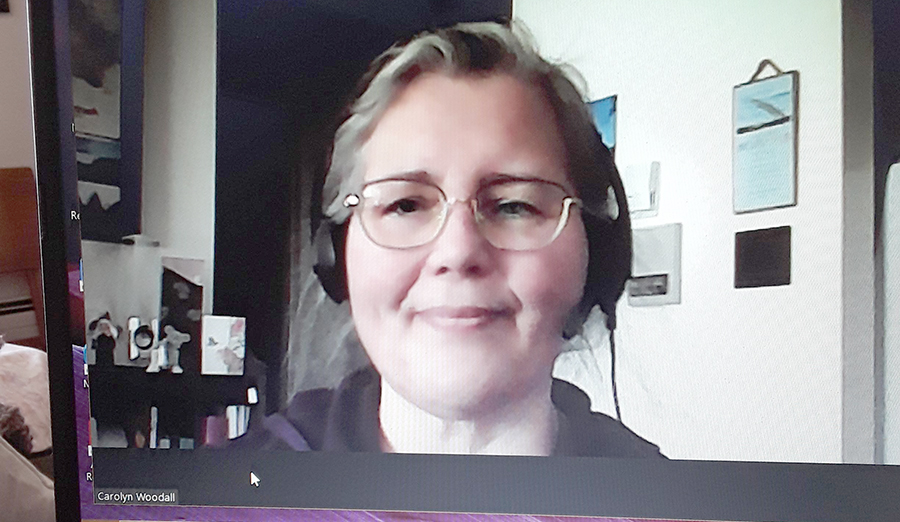

“It’s been quite a radical shift for us to move online. Our Sunday morning worship is now a Zoom gathering, so we are present with each other in the zoom windows. Doing that means that people can adjust their own volume and we can see one another’s faces, our smiles because we don’t have to wear masks. We did open for in-person worship for a while in the fall until things got pretty bad again at the end of November. And it was lovely to be together again in the worship space, except that we had to maintain distance, we had to wear masks, people couldn’t linger to do any visiting. So that was challenging. It’s sort of both, the joy of being together and yet we’re not together in a way we’re used to being together. We also made a decision, we have a committee in the congregation that we call the Re-Opening Committee that has reviewed the information that we’ve had from the provincial health authorities as well as our regional church authorities, and we made the decision that even when we were in person, we would not be singing, even using masks. And I continued, as a worship leader, to keep masks on,” Woodall said.
She says that while the change to the online platform had some difficulties, they did it for their congregation which has at-risk individuals in attendance.
“Our congregation has a number of older folks who have susceptibility because of their age or pre-existing conditions and we have a group of people who work in parts of the community where they are interacting with people who might be more susceptible to COVID-19 where there’s a lot of bubbles coming together. Those people really felt like they didn’t want to cause a risk to the older folks in the congregation,” Woodall said. “Having Zoom worship means those people can participate, having in-person means they can’t, but then having Zoom worship means some of the older folk can’t participate because they don’t know how, but where they live just doesn’t have that strong of internet.”
To help minimize contact, the Bethel United Church provides all its materials to its congregation through digital means.
“We’re trying hard to stay connected with one another, we do our meetings, we have our bible study, we have our fellowship together one morning a week as well as our Sunday worship and it’s all on Zoom. In addition to that, all of our tools we use for worship get sent by Email.”
For those without email or internet, Woodall explained that they set up a buddy system when they moved to their online platform. Using this system, an individual who could access the internet would print off the materials and supply them to the members who couldn’t access them.
Financially, however, Bethel United Church has seen a drop in donations since the start of COVID-19. Like most other churches, donations fund a large part of their operations and help keep their doors open to the public.
“We have what you’d call a bit of a dip, but many many people in the congregation have been quite faithful in sending their offerings in various ways. In the United Church of Canada, we do have a remittance program, and that’s administered by our national church. Some of the people in our congregation are signed up for that program and so their offering is taken right out of their bank account by their authority, then the amounts of that are sent to our congregation each month.”
Woodall attributed the dip in funds to the congregation waiting to donate once they could return to in-person services. While they were able to return to these services briefly, Woodall says they returned to Zoom meetings shortly after when COVID-19 cases began to rise.
While the shift to an online platform was a difficult one to make, Woodall believes that it will stick around even after the pandemic saying the pandemic only proved to accelerate these advancements.
“I think the reality is there’s going to need to be an online presence for any congregation that intends to have an ongoing life. What it may be is a kind of hybrid where there’s an in-person service that’s streamed or recorded for others to participate in at the moment or later. There have been video conversations or things posted by some of the churches in the United Church that have found a really powerful way to be together and supportive of one another and I don’t see that ending. All the ministers across the province of Saskatchewan have an opportunity to be together every week on a Tuesday afternoon. And that’s possible because of the internet. I don’t see us going back.”
The province recently announced the current public health guidelines have been extended to March 19 and all places of worship are being required to reduce capacity to 30 people, including wedding, funeral, and baptismal services. In addition to the reduced capacity, places of worship are not permitted to serve food or drink. Tweet










